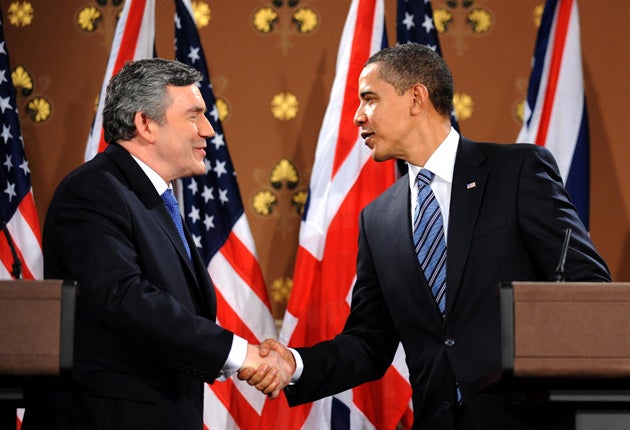Brown hopes for Obama bounce from US summit
Prime Minister could interrupt election campaign to attend nuclear weapons talks

Leaders in trouble at home often turn to the international stage to boost their domestic profile. Their advisers are convinced that images of the Prime Minister mingling with Presidents and Premiers remind voters back in Britain of their leader's clout on the world stage.
There were suspicions yesterday that Gordon Brown is resorting to the same tactic as he confirmed he would interrupt general election campaigning next month to attend a US summit on nuclear weapons.
The conference, taking place on 12 and 13 April, is being hosted by Barack Obama, and will discuss ways of stopping "rogue states" and terrorists from obtaining atomic weaponry.
The Prime Minister will cross the Atlantic in the week that the parties are likely to launch their election manifestos and days before his first televised debate with David Cameron and Nick Clegg. He is expected to confirm the election date the previous week after a visit to Buckingham Palace on 6 April.
Despite the backlash the US President is suffering among American voters, Labour strategists hope Mr Brown attracts some reflected glory from a figure massively popular in Britain.
Civil servants in Downing Street have been more equivocal about the wisdom of the trip. They are supposed to observe strict "purdah" – not allowing themselves to become involved in party political events – once the election has been called. One told The Independent: "Although this is undeniably an important event, it is a very grey area for us."
Mr Brown's comments came as he listed a series of international events – before and after the election expected on 6 May – in his diary. They also included a summit he will chair in London on 31 March on raising cash for poorer countries affected by global warming and a second conference on nuclear weapons in New York in May.
Mr Brown said: "We will gather in Washington next month and in New York the month after to discuss... nuclear security and proliferation."
He added: "We must act now, with our global partners, to reduce the threat of nuclear weapons or nuclear material falling into the hands of rogue states or terrorist groups. That is why we join President Obama's campaign to secure all fissile material across the globe over the next four years." The Cabinet Office, which is responsible for the administration of the civil service, has given the go-ahead to the trip, confirming it is within the rules over purdah.
But it is still negotiating with Downing Street over exactly what Mr Brown will, and will not, be allowed to say during his visit. The understanding is that he will be permitted to explain existing government policy, but not announce any new initiatives. There is always the risk that the Prime Minister could fly into trouble on his trip to Washington. He is unlikely to be offered a one-to-one meeting with the US President during the conference, an omission that could be portrayed as a snub. Mr Brown's most recent visit to America in September was a public relations disaster when it emerged that the White House had spurned five separate requests from Downing Street to hold a bilateral meeting with the President.
Conversely, his press team will have to take care not to be seen to be milking next month's visit too obviously for publicity. Mr Brown faced criticism in October 2008 when he visited Iraq during the Conservative conference and earlier this month when he flew to Afghanistan the day after giving evidence to the Iraq inquiry.
There is the further risk that the Prime Minister could be seen to be shaking hands on the other side of the Atlantic when some crisis unfolds at home. Mr Cameron is aware of the dangers of an unfortunately timed foreign trip. The Conservative leader's visit to Rwanda in July 2007 was designed to present a new face for a party which had been seen as sceptical about the merits of overseas aid. Unluckily for him it coincided with massive floods back home, including in his Oxfordshire constituency.
The Conservatives last night declined to comment on Mr Brown's planned trip. But a spokesman confirmed that Mr Cameron would be in the UK for the duration of the election campaign.
While your back is turned... The danger of foreign trips
It is not always smart for a politician to leave the country at a time of crisis or political activity, because things can happen while they are away to make them wish they had stayed at home.
*When Margaret Thatcher was challenged by Michael Heseltine for the Conservative Party leadership in November 1990, she thought it would give a good impression of being above the fray if she represented the UK at a security conference in Paris. While there, she learned that she had failed to secure enough votes to prevent a second round. Standing on the steps of the British Ambassador's residence, she vowed to fight on but back in London she found that her support was melting away, and she resigned.
*Milton Obote, President of Uganda, arrived at the Commonwealth heads of government summit in Singapore in January 1971 intending to make trouble for Britain over apartheid. He had not reckoned, however, on the trouble he had left behind. His army chief of staff, the brutal, semi-literate Idi Amin, seized power. Obote died in exile.
*Prince Sihanouk, who ruled Cambodia during the Vietnam war, antagonised the Americans with his stubborn neutrality. He set off in March 1970 for a tour of Europe, the USSR and China. He was overthrown by a right-wing military coup while he was in Russia, but he was reinstated as titular king 21 years later until he abdicated in 2004.
Andy McSmith
Join our commenting forum
Join thought-provoking conversations, follow other Independent readers and see their replies
Comments
Bookmark popover
Removed from bookmarks